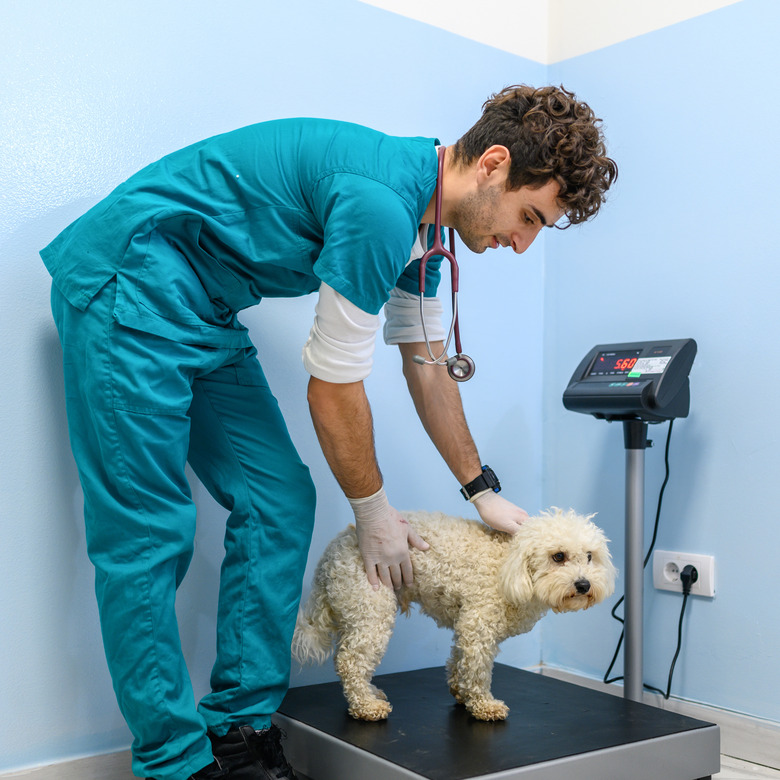How To Use Equine Wormers For Dogs
Horse owners, farmers, and ranchers often find it useful to know how to give their own vaccinations and prophylactic medications. Using horse wormer for a dog sounds tempting in order to save a trip to the veterinarian, but it is best to seek veterinary guidance when trying to treat and prevent internal and external parasites of dogs. If you want to use equine medication on your dog, do so only after consulting a veterinarian to ensure that all precautions are taken into consideration. It's easy to accidentally overdose a dog with an equine dewormer.
Can you use horse wormer for dogs?
Can you use horse wormer for dogs?
Horse dewormer should not be used in dogs without veterinary supervision. There are some potential complications:
- It's too easy to overdose your dog: That's one of the reasons these products are not labeled for use in dogs. Horse dewormer, such as ivermectin paste, often comes in a pre-dosed notched tube or a tube with a dosing dial. One notch on a tube of equine ivermectin is enough to treat a 250-pound horse.
- Heartworm test: Another issue with using ivermectin is that your dog needs a current negative heartworm test before taking the medication. If you give your dog ivermectin and they have a heartworm infection, you can start to kill heartworm larvae and cause your dog to get sick. Heartworm needs to be treated very strategically and with veterinary supervision.
- One active ingredient: A third problem with using horse dewormer is that these products usually have one active ingredient. So, if you treat a dog with equine ivermectin or pyrantel, you're not doing anything about tapeworms, which pets commonly get from fleas. It's best to safely treat and prevent all of these parasites with a single dog product.
Do not use moxidectin/praziquantel or Strongid (pyrantel) horse dewormer in dogs without veterinary supervision because they are very concentrated. For fenbendazole products, there are over-the-counter products for dogs, like Safe-guard for dogs or Panacur C canine dewormer.
What is the difference between horses and dogs when it comes to horse wormer?
What is the difference between horses and dogs when it comes to horse wormer?
The difference is the concentration of the product. Horse products are very concentrated because a small volume is easier to administer. However, the high concentration means that a small error in calculating or measuring could result in toxicity or fatality for a dog.
Another difference is that a lot of equine products contain a single active ingredient, such as ivermectin. Ivermectin kills roundworms and hookworms but doesn't treat tapeworms, Giardia, or Coccidia. And if you're using fenbendazole, you're not preventing heartworm. It's best to use a dog product that has the right combination of active ingredients and that is dosed out in a safe manner.
How to safely administer horse wormer to dogs
How to safely administer horse wormer to dogs
For the safety of your pet, be sure that all precautions are taken into consideration before administering horse wormer to your dog.
Talk with your veterinarian
Talk with your veterinarian first to determine if the horse wormer you want to use will be effective for the parasite you want to treat. You should also find out if the horse wormer is safe for your dog's age, breed, and weight. If your dog is on other medications, find out if it can cross-react with the active ingredient of the product you want to use. Don't use dewormer on dogs who are nursing or debilitated. Consult your veterinarian before deworming a pregnant dog.
Determine what kind of worms need to be treated
Some types of worms are simple to identify visually. Many charts are available online or in books to assist with this task. But dogs can also have intestinal parasites that are not worms, such as Giardia and Coccidia. You will not be able to see these in your dog's stool because they are microscopic. These need to be diagnosed with a fecal parasite test.
Take a stool sample to the veterinarian
Confirm the diagnosis of intestinal worms by taking a stool sample that's from the same day to a veterinarian. These tests are inexpensive and will prevent treating your dog for the wrong kind of parasite.
Unlike intestinal worms, a heartworm infection does not always exhibit external symptoms until it's more advanced. Such an infection must always be diagnosed using a blood test at your veterinarian's office.
Obtain an accurate body weight
In order to calculate a correct medication dose, an exact weight needs to be obtained for all dogs who will be treated. Since most people don't have a dog-size scale at home, you can weigh a small dog or medium-size dog by:
- Weighing yourself on a bathroom scale while holding your dog.
- Then, just weigh yourself.
- Subtract the second number from the first number.
- Use the result to calculate your dog's dose or have your veterinarian do that for you. Follow their directions for when and how to administer the medication.
It's possible that your dog's weight may be too light for a bathroom scale to accurately measure it. In this case, a gram scale or a baby scale is needed. For large dogs, it's best to go to your veterinarian's office to get an accurate weight.
Can you give dogs ivermectin horse wormer?
Can you give dogs ivermectin horse wormer?
You should only give your dog an ivermectin horse wormer if they are heartworm negative at the time you're administering it AND if your veterinarian directs you to use it.
Though ivermectin kills internal parasites like roundworms and hookworms in dogs, it makes more sense to use an over-the-counter dog product like Panacur-C for dogs, which safely treats roundworms, hookworms, whipworms, and one type of tapeworm. This product has a wide margin of safety in dogs. Ivermectin does not. Dogs under 6 weeks of age should not take ivermectin. If your dog needs a heartworm preventative, get one from your veterinarian that covers all of the above-mentioned parasites plus heartworm.
The concentration of equine ivermectin makes it an unsuitable product to use as a heartworm preventative. With the exception of large- and giant-breed dogs, you would not even be able to measure out a dog's heartworm preventative dose with the smallest syringe (1 cc) because the dose would be less than the lowest measurement on the syringe. Dogs who receive a heartworm preventative need to be current on a negative heartworm test. Giving a dog ivermectin when they have heartworm can cause a shocklike reaction from the dying larvae in the dog's bloodstream.
The amount of ivermectin you give to a dog needs to be enough that it prevents heartworm infection but not so much that it causes toxicity or fatality. The toxic level can vary by dog. Some herding breeds, such as Shetland sheepdogs, collies, and Australian shepherds, have a genetic mutation called MDR1 that makes them more prone to toxic effects. This is yet another reason it's recommended to obtain a product approved for use in dogs.
Ivermectin can also cross-react with other medications that your dog may be on, such as anti-fungals. High doses of ivermectin can cause a drug interaction with certain flea preventatives, like Comfortis or Trifexis.
What happens if a dog eats horse wormer?
What happens if a dog eats horse wormer?
If your dog eats horse wormer of any sort, call your veterinarian or a pet poison hotline immediately. Depending on what product it was, the size of your dog, their breed, their age, and their general health, your pet may need to be seen by a veterinarian immediately. They might induce vomiting and recommend other treatments depending on how much time has passed since your dog ate the wormer.
Potential side effects of ivermectin include:
- Vomiting
- Diarrhea
- Appetite loss
- Lethargy
- Dilated pupils
- Unsteadiness or lack of coordination
- Hypothermia
- Tremors
- Seizures
- Blindness
- Death
The bottom line
The bottom line
Though large-animal owners may find it tempting to give their dog equine formulations of dewormer paste for parasite control, these products are not labeled for use in dogs because of their high concentration. A small error in calculation or in measurement can result in toxicity and even death. Because of a genetic mutation, caution and veterinary supervision should be used when giving ivermectin to certain dog breeds, such as collies, Shetland sheepdogs, and Australian shepherds. Before using any equine dewormer on your dog, talk with your veterinarian to make sure it's appropriate and safe for your pet.


